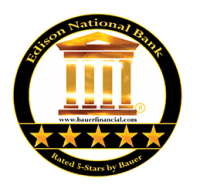For our everyday business purposes — such as to process your transactions, maintain your account(s), respond to court orders and legal investigations, or report to credit bureaus
- Does Edison National Bank share?
- Can you limit this sharing?
For our marketing purposes — to offer our products and services to you
- Does Edison National Bank share?
- Can you limit this sharing?
For joint marketing with other financial companies
- Does Edison National Bank share?
- Can you limit this sharing?
For our affiliates’ everyday business purposes — information about your transactions and experiences
- Does Edison National Bank share?
- Can you limit this sharing?
For our affiliates’ everyday business purposes — information about your creditworthiness
- Does Edison National Bank share?
- Can you limit this sharing?
For nonaffiliates to market to you
- Does Edison National Bank share?
- Can you limit this sharing?







